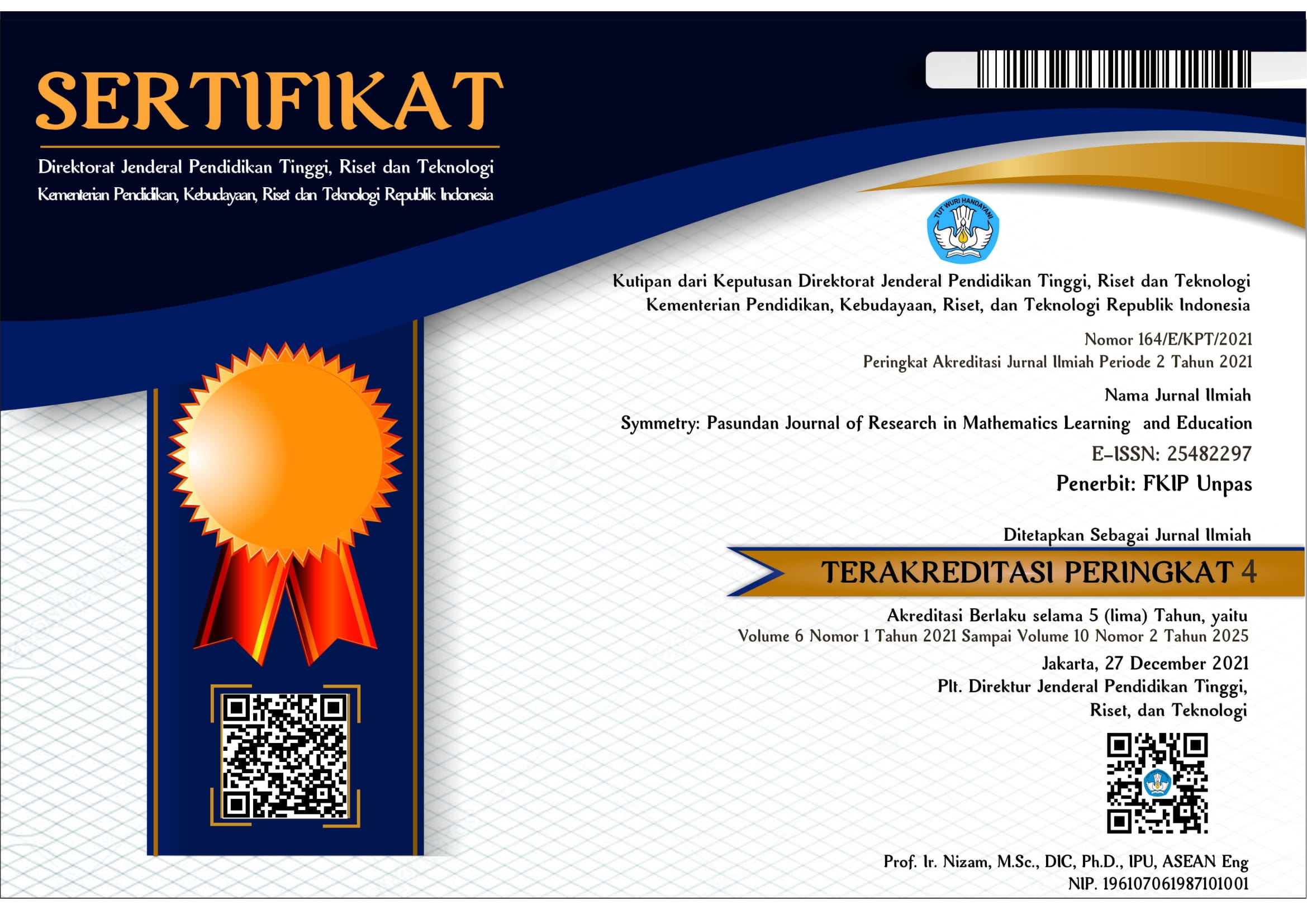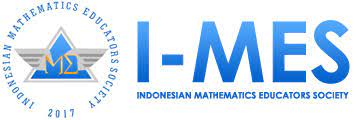SYSTEMATIC LITERATURE REVIEW : KEMAMPUAN PEMECAHAN MASALAH MATEMATIS SISWA PADA MODEL PROBLEM BASED LEARNING (PBL) BERPENDEKATAN STEM
DOI:
https://doi.org/10.23969/symmetry.v10i1.27376Abstract
The purpose of this article is to explain the relationship between the PBL learning model and students' problem solving abilities
using a STEM approach. The method used in this article is a systematic literature review (SLR). A systematic literature review
is carried out by searching various written sources originating from books, articles and journals, or documents that are relevant
to the problem being studied. This research used 14 articles that met the inclusion criteria, namely with research subjects of
middle school - high school students, meeting syntax 1-4 and between 2015 and 2023. These articles were searched using
national and international journal databases, namely Google Scholar, Researchgate, Scopus and Science Direct . This article
concludes that the ability of middle school or high school students when solving a problem increases after implementing the
PBL learning model with a STEM approach. The next recommendation for researchers is to dig deeper into the use of the PBL
model and its consequences in problem solving at a further level with a different approach.
Downloads
References
Abdulah, Nabila, Z., Fitriyani, N., & Dewi, H. L. (2022). Implementasi Model Pembelajaran PBL Bernuansa STEM terhadap Kemampuan Pemecahan Masalah Siswa SMP Negeri 1 Wonopringgo. SANTIKA: Seminar Nasional Tadris Matematika UIN K.H. Abdurrahman Wahid Pekalongan, 190–201.
Altan, E. B., Ozturk, N., & Turkoglu, A. Y. (2018). Socio-scientific issues as a context for STEM education: A case study research with pre-service science teachers. European Journal of Educational Research, 7(4), 805–812. https://doi.org/10.12973/eu-jer.7.4.805
Anggiana, A. D. (2019). Implementasi Model Problem Based Learning (PBL) Untuk Meningkatkan Kemampuan Pemecahan Masalah Matematis Siswa. Symmetry: Pasundan Journal of Research in Mathematics Learning and Education, 4(2), 56–69. https://doi.org/https://doi.org/10.23969/symmetry.v4i2.2061
Arifin, N. (2020). Efektivitas Pembelajaran Stem Problem Based Learning Ditinjau Dari Daya Juang Dan Kemampuan Pemecahan Masalah Matematis Mahasiswa Pgsd. JPMI (Jurnal Pendidikan Matematika Indonesia), 5(1), 31. https://doi.org/10.26737/jpmi.v5i1.1644
Azis, & Sugiman. (2015). Analisis Kesulitan Kognitif Dan Masalah Afektif Siswa Sma Dalam Belajar Matematika Menghadapi Ujian Nasional. Jurnal Riset Pendidikan Matematika, 2(2), 162–147. http://journal.uny.ac.id/index.php/jrpm/index
Bell, D., Morrison-Love, D., Wooff, D., & McLain, M. (2018). STEM education in the twenty-first century: learning at work—an exploration of design and technology teacher perceptions and practices. International Journal of Technology and Design Education, 28(3), 721–737. https://doi.org/10.1007/s10798-017-9414-3
Ceylan, S., & Ozdilek, Z. (2015). Improving a Sample Lesson Plan for Secondary Science Courses within the STEM Education. Procedia - Social and Behavioral Sciences, 177(September), 223–228. https://doi.org/10.1016/j.sbspro.2015.02.395
Diana, N., Suryadi, D., & Dahlan, J. A. (2020). Analysis of students’ mathematical connection abilities in solving problem of circle material: Transposition study. Journal for the Education of Gifted Young Scientists, 8(2), 829–842. https://doi.org/10.17478/JEGYS.689673
Dwianjani, N. K. V., & Candiasa, I. M. (2018). Identifikasi Faktor-Faktor yang Mempengaruhi Kemampuan Pemecahan Masalah Matematika. NUMERICAL: Jurnal Matematika Dan Pendidikan Matematika, 2(2), 153. https://doi.org/10.25217/numerical.v2i2.276
Faoziyah, N. (2021). Kemampuan Pemecahan Masalah Matematis Siswa Melalui Pendekatan STEM Berbasis PBL. Pasundan Journal of Mathematics Education : Jurnal Pendidikan Matematika, 11(Vol 11 No 1), 50–64. https://doi.org/10.23969/pjme.v11i1.3942
Hadi, S., & Radiyatul, R. (2014). Metode Pemecahan Masalah Menurut Polya untuk Mengembangkan Kemampuan Siswa dalam Pemecahan Masalah Matematis di Sekolah Menengah Pertama. EDU-MAT: Jurnal Pendidikan Matematika, 2(1), 53–61. https://doi.org/10.20527/edumat.v2i1.603
Heryandi, Y. (2018). Problem Based Learning Dengan Strategi Konflik Kognitif Meningkatkan Kemampuan Berpikir Kritis Matematis. Eduma : Mathematics Education Learning and Teaching, 7(1), 93–107. https://doi.org/10.24235/eduma.v7i1.2887
Ibrahim, I., Kosim, K., & Gunawan, G. (2017). Pengaruh Model Pembelajaran Conceptual Understanding Procedures (CUPs) Berbantuan LKPD Terhadap Kemampuan Pemecahan Masalah Fisika. Jurnal Pendidikan Fisika Dan Teknologi, 3(1), 14–23. https://doi.org/10.29303/jpft.v3i1.318
Kapila, V., & Iskander, M. (2014). A. Typical Sensor-Based Experiments. 15(1), 46–51.
Kencana, M. A., Musri, & Syukri, M. (2020). The effect of science, technology, engineering, and mathematics (STEM) on students’ creative thinking skills. Journal of Physics: Conference Series, 1460(1), 1–12. https://doi.org/10.1088/1742-6596/1460/1/012141
Khoerunnisa, D., Amiroh, A. I., Nurshalihah, N. D., & Putri, F. M. (2021). ANALISIS IMPLEMENTASI PEMBELAJARAN BERBASIS STEM UNTUK MEMFASILITASI KEMAMPUAN PEMECAHAN MASALAH. 3(2), 169–181.
Lathiifah, I. J., & Kurniasi, E. R. (2020). Analisis Kemampuan Pemecahan Masalah Siswa Pada Pembelajaran SPLDV Berbasis STEM. Jurnal Cendekia : Jurnal Pendidikan Matematika, 4(2), 1273–1281. https://doi.org/10.31004/cendekia.v4i2.354
Lestari, K. E., & Yudhanegara, M. R. (2017). Penelitian Pendidikan Matematika. Karawang : Aditama.
Monica, H., Kesumawati, N., & Septiati, E. (2019). Pengaruh Model Problem Based Learning Terhadap Kemampuan Pemecahan Masalah Matematis Dan Keyakinan Matematis Siswa. MaPan, 7(1), 155–166. https://doi.org/10.24252/mapan.2019v7n1a12
OECD. (2019). PISA 2018 Assessment and Analytical Framework. In OECD Publishing. https://doi.org/https://doi.org/10.1787/b25efab8-en
Pixyoriza, P., Nurhanurawati, N., & Rosidin, U. (2022). Pengembangan Modul Digital Berbasis STEM untuk Mengembangkan Kemampuan Pemecahan Masalah. Edumatica : Jurnal Pendidikan Matematika, 12(01), 76–87. https://doi.org/10.22437/edumatica.v12i01.17541
Rasid, N. S. M., Nasir, N. A. M., Singh, P., & Han, C. T. (2020). STEM integration: Factors affecting effective instructional practices in teaching mathematics. Asian Journal of University Education, 16(1), 56–69. https://doi.org/10.24191/ajue.v16i1.8984
Rerung, N., Sinon, I. L. ., & Widyaningsih, S. W. (2017). Penerapan Model Pembelajaran Problem Based Learning (PBL) untuk Meningkatkan Hasil Belajar Peserta Didik SMA pada Materi Usaha dan Energi. Jurnal Ilmiah Pendidikan Fisika Al-Biruni, 6(1), 47–55. https://doi.org/10.24042/jpifalbiruni.v6i1.597
Riani, N. M. S. T., Suweken, G., & Sariyasa, S. (2022). Pengembangan Perangkat Pembelajaran dengan Pendekatan STEM untuk Meningkatkan Kemampuan Pemecahan Masalah Matematika. JIPM (Jurnal Ilmiah Pendidikan Matematika), 11(1), 204. https://doi.org/10.25273/jipm.v11i1.13457
Rohmah, S., Syutaridho, & Wardani, A. K. (2023). Pengembangan Lembar Kerja Peserta Didik Berbasis STEM pada Materi Transformasi Geometri di Kelas XI SMA. Journal of Education in Mathematics, Science, and Technology, 6(1), 1–10. https://jemst.ftk.uinjambi.ac.id/index.php/jemst/article/view/87
Santos-Trigo, M. (2019). Mathematical Problem Solving and the Use of Digital Technologies. https://doi.org/10.1007/978-3-030-10472-6_4
Sapitri, Y., Utami, C., & Mariyam, M. (2019). Analisis Kemampuan Pemecahan Masalah Matematis Siswa dalam Menyelesaikan Soal Open-Ended pada Materi Lingkaran Ditinjau dari Minat Belajar. Variabel, 2(1), 16. https://doi.org/10.26737/var.v2i1.1028
Saputri, V., & Herman, T. (2022). Integrasi Stem Dalam Pembelajaran Matematika : Dampak Terhadap Kompetensi Matematika Abad 21. Jurnal Pembelajaran Matematika Inovatif, 5(1), 247–260. https://doi.org/10.22460/jpmi.v5i1.247-260
Septiani, A., Pujiastuti, H., & Faturrohman, M. (2022). Systematic Literature Review : Penerapan Model Problem Based Learning untuk Meningkatkan Kemampuan Pemecahan Masalah Matematika. Edukatif : Jurnal Ilmu Pendidikan, 4(6), 7882–7893. https://doi.org/10.31004/edukatif.v4i6.4263
Setiawan, H., Handayani, T., & Muslimahayati, M. (2021). Pengaruh Model Pembelajaran Berbasis Masalah Terhadap Kemampuan Pemecahan Masalah Matematis Siswa di MTs Ahliyah 1 Palembang. Suska Journal of Mathematics Education, 7(1), 31. https://doi.org/10.24014/sjme.v7i1.9231
Sudarsono, Kartono, Mulyono, & Mariani, S. (2022). The Effect of STEM Model Based on Bima’s Local Cultural on Problem Solving Ability. International Journal of Instruction, 15(2), 83–96. https://doi.org/10.29333/iji.2022.1525a
Sudiansyah, S., Kurnianto, D., & T, A. Y. (2022). Peningkatan Kemampuan Pemecahan Masalah Siswa dalam Pembelajaran Metematika Melalui Model STEM Berbasis Microsoft Teams Sebagai Kelas Digital dan Aplikasi Wolfram Alpha. Jurnal Basicedu, 6(3), 3626–3638. https://doi.org/10.31004/basicedu.v6i3.2716
Suherman, S., & Vidákovich, T. (2022). Assessment of mathematical creative thinking: A systematic review. Thinking Skills and Creativity, 44(January), 101019. https://doi.org/10.1016/j.tsc.2022.101019
Zulfitri, H. (2019). Analisis Kemampuan Pemecahan Masalah Matematika Setelah Pembelajaran dengan Pendekatan MEAs pada Materi Sistem Persamaan Linier Tiga Variabel. Jurnal Gantang, 4(1), 7–13. https://doi.org/10.31629/jg.v4i1.881
Downloads
Published
Issue
Section
License
Copyright (c) 2025 Symmetry: Pasundan Journal of Research in Mathematics Learning and Education

This work is licensed under a Creative Commons Attribution 4.0 International License.
Hak Cipta sepenuhnya ditangan jurnal.



















